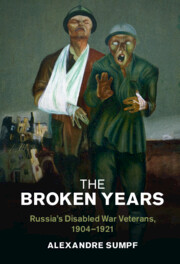Book contents
- The Broken Years
- Studies in the Social and Cultural History of Modern Warfare
- The Broken Years
- Copyright page
- Contents
- Figures
- Tables
- Acknowledgements
- Note on Usage
- Introduction
- 1 An Overwhelming Loss
- 2 The Right to Health
- 3 A Social Status Renegotiated by the War
- 4 Discriminatory Social Welfare
- 5 An Ephemeral Political Spring
- 6 The Devaluation of the War Experience
- Conclusion
- Bibliography
- Index
6 - The Devaluation of the War Experience
Published online by Cambridge University Press: 10 February 2022
- The Broken Years
- Studies in the Social and Cultural History of Modern Warfare
- The Broken Years
- Copyright page
- Contents
- Figures
- Tables
- Acknowledgements
- Note on Usage
- Introduction
- 1 An Overwhelming Loss
- 2 The Right to Health
- 3 A Social Status Renegotiated by the War
- 4 Discriminatory Social Welfare
- 5 An Ephemeral Political Spring
- 6 The Devaluation of the War Experience
- Conclusion
- Bibliography
- Index
Summary
The brutal negation of rights born out of self-sacrifice for country was part of the appalling devaluation of the war experience in early Soviet Russia. On the whole, these veterans who came home prematurely, before the war’s end, experienced bigger struggles in returning to private life than did their able-bodied comrades: they had to get out of the collective norms imposed by the army, find their place within the civilian population again, and, in the end, find peace. Their long-awaited return occasioned neither joy nor celebration, but rather the destabilisation of families and isolation from their communities. The loss of their ability to work, their prolonged absence, and the war’s trauma permanently undermined their authority as husbands and fathers. They were less heroes than victims of the war, and did not obtain recognition from the new socialist state, even though at the time it was putting in place a welfare system extending coverage to a large number of categories. The Bolsheviks indeed constructed their regime in opposition to the ‘imperialist war’ and one of its most prominent symbols: the disabled ex-servicemen of the tsarist army.
- Type
- Chapter
- Information
- The Broken YearsRussia's Disabled War Veterans, 1904–1921, pp. 231 - 267Publisher: Cambridge University PressPrint publication year: 2022

